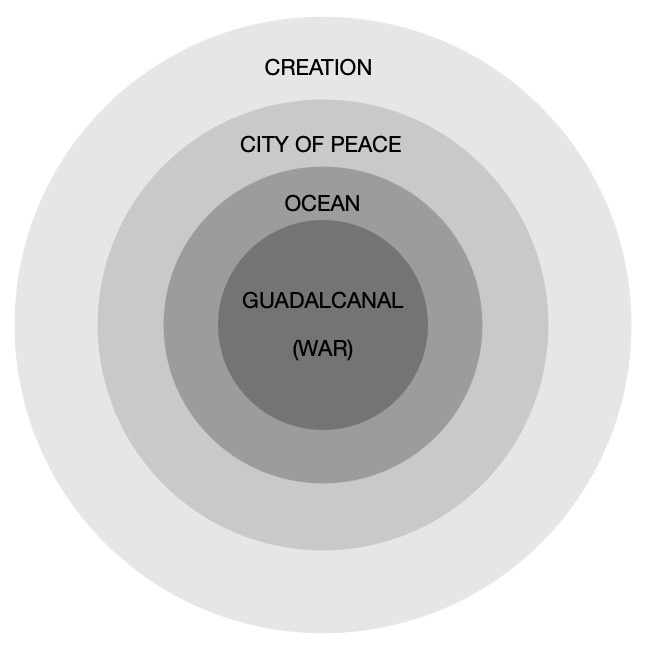My new favorite athlete is Australian high-jumper Nicola Olyslagers, who before every jump looks into the camera, smiles, and talks to someone (family? God?), and after every jump trots back to her corner to write in her journal. She ended up with another silver medal (which she also won in Tokyo). When her husband suggested that she shift to an iPad, she was adamant: “There’s nothing like pen to paper.”

UPDATE: Turns out I’m not the only one who was obsessed by this competition. “Nicola Olyslager’s notebook v Yaroslava Mahuchikh’s sleeping bag. That’s what it all comes down to now.”
I’ve been listening to Stephen Fry reading the Sherlock Holmes canon and it’s just irresistible. 🎧📚
L. M. Sacasas: “My contention, then, is that when we are confronted with the opportunity to outsource the labor of articulation, we will find that possibility more tempting to the degree that we experience a sense of incompetency and inadequacy, a sense which may have many sources, not least among which is the failure to stock our mind, heart, and imagination.”
crisis!
For many years I’ve been writing posts for my big blog using the excellent Mac app MarsEdit, but three days ago, thanks to a change in security procedure at my service provider, it stopped working. Worse: trying to post from MarsEdit brought down my whole site. After some back and forth, it was made clear to me that there would be no fix.
So what do I do now? One thing I won’t do is write in the WordPress editor — that’s a nightmarish experience. For now I am writing my posts in BBEdit and then pasting them into the WordPress editor, which is awkward; I don’t think that’s a long-term solution. So my options are:
- Get a new hosting provider and go through the long slog of transferring all my data there and hoping that nothing gets lost.
- Just do all my blogging here at micro.blog (which, by the way, works perfectly with MarsEdit).
That second choice is appealing because (a) it’s easy to write in micro.blog on virtually any device, (b) there are multiple ways to post, and (c) it would enable me to consolidate my online presence in one place, since I am already using micro.blog for photos, links, reading management, etc.
But over at blog.ayjay.org I don’t just have fifteen years of posts, I have fifteen years of tagged posts. I would really miss being able to relate posts to one another by tag. Also, I like the theme I’m using there better than any available micro.blog theme.
So I’m torn. At the moment I’m leaning towards going all-in here at micro.blog. But I’d be interested to hear any thoughts from you, dear readers.
One of the lighter moments from the best and most important day of my life, forty-four years ago today. Happy anniversary, my beloved.

Guadalcanal: 6

Around the rim of the shield Hephaestus made for Achilles is the Ocean River, the great water that (Homer believed) rings our world — Middle-earth, it’s sometimes called: the place where we live and, often enough, fight and kill and die. And, as I have noted, Guadalcanal Island is ringed by that very ocean. Guadalcanal is thus a kind of microcosm, but one in which the agonistic character of life, the struggle that reveals who we are, is accelerated and intensified.
Hephaestus’s ocean is a kind of frame, and these stories of Guadalcanal I’ve been exploring are all necessarily framed by the passage across the waters to and from the place of struggle. But what Terrence Malick does in his film The Thin Red Line is add another layer of framing. His version of Guadalcanal does not begin with the crossing of the liminal sea, but rather with two additional contexts.
The first shot of the film shows a crocodile slipping into water; the last shot of the film shows a small young leafy palm standing, somewhat unexpectedly, in shallow water on a beach.
That first shot is followed by a scene in which we see Jim Caviezel’s Private Witt enjoying the company of a seaside Melanesian community. (We later learn that he’s not taking a vacation, he’s gone AWOL.) Then we shift to the transport ship taking the soldiers to Guadalcanal.
That last shot is accompanied by a sound: the sound of a Melanesian a cappella choir singing one of the songs we heard them singing in that early scene. This is immediately after we see a transport ship removing the soldiers from Guadalcanal.
So The Thin Red Line gives us four … let’s call them existential layers.

A key question for any one soldier — well, actually, any one human being — is: How many of these layers do you perceive? How much of what is is perceptually and epistemologically available to you?
There’s something fundamentally disorienting about Malick’s movie. On the one hand, as I noted in an earlier post, the soldier who confronts another soldier in battle, in the agon, is confronting himself. And this is existentially harrowing.
But notice that Private Witt has no interest in the agon. After he goes AWOL among the Melanesian islanders and is forcibly returned to his unit, Sergeant Welsh removes him from battle duty and makes him a stretcher-bearer. Later, he pleads to be returned to battle, not because he wants to fight, but simply because C-for-Charlie Company is, he says, “my people.” We see him tending to the sick and then, at the end, drawing Japanese soldiers away from the other members of his company — and by so doing sacrificing his life. He lifts his weapon in that last moment, but not to fire — rather, to draw fire from the soldiers who surround him.
Private Witt undergoes his own agon, but it is not that of the warrior. Before that final confrontation, he has already faced himself — not as Hector faces Achilles but in a very different way. He had received a kind of revelation, and he is capable of receiving it, I think, just because, rather than immersing himself wholly in the war, he has already attended to those existential layers that his fellow soldiers never notice.
About two-thirds of the way into the movie, when C-for-Charlie company has just ventured well inland to destroy a small contingent of Japanese soldiers, some of them reflect on what they have done. Corporal Fife (Adrien Brody) remembers a conversation in which another soldier told him that dead people were just like dead dogs. And then we see Witt staring intently at something. After a few seconds we are allowed to see what he sees: the half-buried face of a dead Japanese soldier.

And then the soldier (who is not a dead dog) speaks to him — speaks to the one person in this whole company who has been formed and equipped in such a way that he can hear. The Japanese soldier says:
Are you righteous? Kind? Does your confidence lie in this? Are you loved by all? Know that I was, too. Do you imagine your suffering will be any less because you loved goodness … truth?
And it is this revelation, I think, that enables Witt to do the great work of self-sacrifice that forms the climax of this film.
If you want a year’s worth of ideas to explore, just read the most recent issue of Sam Arbesman’s newsletter. My head is almost literally spinning!
Ah. The emails are coming.

Naomi Girma is the William Saliba of the USWNT. ⚽️
Re: this David French column on why what Christians do matters more they what they (claim to) believe, I think of this sentence from George Eliot’s story “Janet’s Repentance”: “Religious ideas have the fate of melodies, which, once set afloat in the world, are taken up by all sorts of instruments, some woefully coarse, feeble, or out of tune, until people are in danger of crying out that the melody itself is detestable.”
Guadalcanal: 5
If, as I said in my previous post, to confront another soldier in war is to confront yourself, then … isn’t that other soldier … you? Yes. Necessarily.

It is this necessity that produces a constant hum of meditation in Malick’s The Thin Red Line: “Maybe all men got one big soul,” thinks one of the soldiers.
Many of the voiceovers in this movie are clearly identified soliloquies: Nick Nolte’s Col. Tall, for instance, or Elias Koteas’s Captain Staros. But three characters in this movie — Private Witt (Jim Caviezel), Private Bell (Ben Chaplin), and Private Train (John Dee Smith) — have distinct Southern accents, and it’s not always easy to tell their voices apart. And I think that is intentional. That is, these thoughts are not supposed to be identifiable with one soldier. They are the thoughts of all the soldiers. (I suspect it matters that all of these speakers are privates, the lowest rank — the ones not differentiated from their neighbors by holding command.)
Sometimes their voices are identifiable. It is Private Witt, the central character in the film, who speculates that all of us share a soul — what Emerson called the “Over-Soul”:
The Supreme Critic on the errors of the past and the present, and the only prophet of that which must be, is that great nature in which we rest, as the earth lies in the soft arms of the atmosphere; that Unity, that Over-soul, within which every man's particular being is contained and made one with all other; that common heart, of which all sincere conversation is the worship, to which all right action is submission; that overpowering reality which confutes our tricks and talents, and constrains every one to pass for what he is, and to speak from his character, and not from his tongue, and which evermore tends to pass into our thought and hand, and become wisdom, and virtue, and power, and beauty. We live in succession, in division, in parts, in particles. Meantime within man is the soul of the whole; the wise silence; the universal beauty, to which every part and particle is equally related; the eternal ONE. And this deep power in which we exist, and whose beatitude is all accessible to us, is not only self-sufficing and perfect in every hour, but the act of seeing and the thing seen, the seer and the spectacle, the subject and the object, are one. We see the world piece by piece, as the sun, the moon, the animal, the tree; but the whole, of which these are the shining parts, is the soul.And it is Private Bell who muses, “Who lit this flame in us? No war can put it out.” In us. The flame of humanity, "the universal beauty, to which every part and particle is equally related."
But I believe, as some of the more attentive viewers of this film have argued, that the character we hear from most often, in voiceover, is Private Train, whom we see at any length only twice: Once as the soldiers are approaching the island, confessing his fear, and once as they are leaving the island, saying that he has had a lifetime of experience already and has earned some peace. Surely in these points as in others he speaks for his colleagues. One big experience for C-for-Charlie Company; one big soul.
(Private Train also has a tattoo on his upper arm, which reads: 1 JOHN 4:4. For those of you keeping score at home, that verse reads: “Ye are of God, little children, and have overcome them: because greater is he that is in you, than he that is in the world.” We may return to this.)
But the Over-Soul is bigger than what can be held on an American troop ship. One of those American soldiers says to a Japanese soldier — see the image at the top of this post — “Where you’re going you’re not coming back from.” And it’s true. But it’s equally true of the man who speaks those words. What you say about your enemy you say about yourself, whether you know it or not.
When I hear that sentence I think of a poem by Horace. David Ferry’s translation follows.
Aequam memento (Odes II.3)
When things are bad, be steady in your mind; Dellius, do not be Too unrestrainedly joyful in good fortune. You are going to die.It does not matter at all whether you spend Your days and nights in sorrow, Or on the other hand, in holiday pleasure, Drinking Falernian wine
Of an excellent vintage year, on the river bank. Why is it, do you suppose, That the dark branches of those tall pines and those Poplars’ silvery leafy
Branches love to join, coming together, Creating a welcoming shade? Have you not noticed how in the quiet river The current shows signs of hurry,
Urging itself to go forward, going somewhere, Making its purposeful way? By all means tell your servants to bring you wine, Perfumes, and the utterly lovely
Too briefly blossoming flowers of the villa garden; Yes, of course, while youth, And circumstance, and the black threads of the Sisters Suffer this to be so.
You are going to have to yield those upland pastures, The ones you bought just lately; You are going to yield the town house, and the villa, The country place whose margin
The Tiber washes as it moves along. Heirs will possess all that Which you have gathered. It does not matter at all If you are rich, with kings
Forefathers of your pride; no matter; or poor, Fatherless under the sky. You will be sacrificed to Orcus without pity. All of us together
Are being gathered; the lot of each of us Is in the shaking urn With all the other lots, and like the others Sooner or later our lot
Will fall out from the urn; and so we are chosen to take Our place in that dark boat, In that dark boat, that bears us all away From here to where no one comes back from ever.
Recent listening: Ralph Vaughan Williams’s wondrous Fifth Symphony. ♫
That admirable journal Current has posted its own list of the 100 best books of the 21st century so far and if you think I’m linking to that because a couple of my books are mentioned I am so offended.
The excellent folks at Reclaim Hosting are doing an upgrade today that is not supposed to affect access to my site (ayjay.org, blog.ayjay.org) — but, alas, my site is down.


